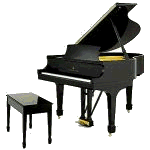

Composers from Amazon.com's Get Started in Classical:
| Bach | Glass | Schubert |
| Beethoven | Mahler | Stravinsky |
| Copland | Mozart | Tilson Thomas |
| Corigliano | Mutter | Wagner |
| Debussy | Pärt | Zimerman |
| NEW! Huang Additional composers and musicians |
||
Aaron Copland
This is from Amazon.com's Get Started in Classical.
The direct appeal and irresistible imagination of Aaron Copland's works make him one of the defining voices of American music
With his large, craggy countenance, Aaron Copland (1900-1990) was once described as possessing "a kind of Old Testament grandeur." And indeed his music conveys an almost prophetic majesty and confidence. Though Copland went abroad to study his craft as a young man, his best-known works from the 1930s and '40s came to define, like the music of George Gershwin, an authentic American voice. Copland was interested above all in communicating with a wide audience rather than speaking only to an elite. Listen to the selections on this disc--most of them drawn from his pioneering ballet music written for Agnes de Mille and Martha Graham--and you will hear a kind of directness and generosity of spirit that might call to mind the poetry of Walt Whitman.
In the idyllic, dreamy opening of Appalachian Spring, for example, Copland immediately sets the pastoral scene for you with a simple three-note idea (notice how this theme is used more assertively in Fanfare for the Common Man) that layers into bright, warm chords, like a dawn mist that slowly evaporates. It's the essence of simplicity. The promise here of a fresh beginning is as bright and enveloping as the sunny textures of a Georgia O'Keefe painting. In this and the other ballet suites on the disc, Copland uses a collage technique that creates exciting variety, moving back and forth from episodes of nostalgia and reflection to fast sections that crackle with jagged rhythms. One key to how he creates a recognizable American voice is actually based on the time-honored technique among classical composers of using folk music as a source of material. There is the Shaker melody that ripples forth in the variations of the second-to-last section of Appalachian Spring, as well as cowboy ballads and square-dance tunes (in Billy the Kid and Rodeo). But Copland's personal stamp is everywhere obvious in how he decks out such materials in vibrant colors and rhythms.
The performances here are from Leonard Bernstein's prime with the New York Philharmonic and involve a true marriage of minds. Bernstein was a lifelong friend and proponent of Copland and his music. Listen, for example, to the split-second timing as Rodeo crashes to its opening, and you're instantly in touch with the brash exuberance and optimism that pervades Copland's best-loved pieces. Whether this is the first or the hundredth time you hear them, they never lose their power to engage--the surest sign of music that lasts.
Thomas May, Classical Editor
More Copland can be found in Musical Information and the Listening Center
O'Connor Music Studio Recommendations
lists Books, CD's, Cassette Tapes, Computer Programs, Music Scores DVD's, Videos and more
from amazon.com, as well as several other sources.
 If you are looking for ideas for children's books, cd's, cassette tapes, computer
programs, games and toys, click here for some ideas.
If you are looking for ideas for children's books, cd's, cassette tapes, computer
programs, games and toys, click here for some ideas.
Many thanks to Dearest for everything!
is located
in Fairfax, Virginia
Over 30 Years
~~
Piano, Organ
Electric Keyboard
Accompanying
Email Mary O'Connor
All rights reserved.
Site design and maintenance by
O'Connor O'Riginals Web Design